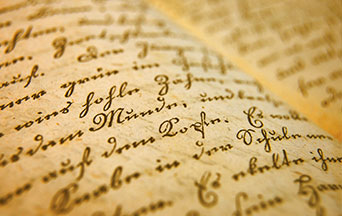
Having lost L’Univers and proving unable to publish another newspaper in Belgium, Louis Veuillot faced a very gloomy prospect. His family’s livelihood depended on the newspaper. Its suppression threatened them with poverty. He received many job offers. Some were tempting.
Nonetheless, he refused them all so he would be free to pursue his career in journalism. Nothing could dissuade him from this endeavor. He was wholly dedicated to the Church and sure Providence wanted him to work as a journalist. Therefore, he remained generously faithful to his vocation even when circumstances seemed to make it impossible.
Eternal and Natural Law: The Foundation of Morals and Law
In 1862, a political organization called the Catholics of Avignon allied with the Royalists. They offered Louis Veuillot a seat as a deputy in the National Assembly. Mr. Delcamps, on behalf of the Catholics, and Count de Valori, on behalf of the Monarchists, tried to persuade him to accept. Veuillot replied with a letter to Delcamps. That missive is a genuine model of detachment. It portrays the soul of a man viscerally penetrated with a spirit of faith and confidence in Providence:
“I am not tempted. What I do quietly at home is worth more or less what I could do in the House so that I am not obliged to lose my virginity in matters of oath. When I had the government’s sympathies and only slight concerns for the future, I twice refused to be a candidate. The first time, because the job of deputy seemed onerous for a man without a fortune; the second time, because the job itself had become profitable and, in short, was a gift from the powers-that-be. I refused the honors and income as I had refused the Legion of Honor. I know this is not the same case, and my aversion is less intense. However, to accept, I would want two things that I don’t see: first, duty, and then an appeal from the clergy.
“I am very grateful to Mr. de Valori for thinking of me. I thank him and ask permission to say frankly, in a business-like manner, that I do not need his patronage. Honorable as it is, it is a party sponsorship, and I cannot and do not want to be committed to any party. Mr. de Valori will understand this well; his friends would probably be less understanding. As La Bédollière rightly says, I am a sacristan, a humble servant of the Church; I wear its livery and accept no other servitude. You read everything I have written; thus, I need not tell you how much of a monarchist I am. But I am, first of all, a sacristan. My profession of faith, even political, is the Creed. Et unam, sanctam, catholicam, et apostolicam Ecclesiam. This must be said and heard, and for me to come forward, the Church must call me.”
Louis Veuillot devoted himself to writing books to support his family. Most of his book-length works are from this period, including the most famous: Le Parfum de Rome (The Scent of Rome) and Les Odeurs de Paris (The Smells of Paris). He sought to replace his lost newspaper with books. He continued to monitor the Church’s enemies without renouncing his ideal of journalism or accepting commitments that could jeopardize his work.
His books were hugely successful, each with multiple editions following one after another. Indeed, Veuillot succeeded, at least in part, in keeping the flame kindled by l’Univers alive among Catholics. From the financial point of view, the result was much better than he could have hoped. Never as editor of l’Univers had he earned as much as he did as an author celebrated by all. His friends applauded him. His enemies fought him with their usual hatred.
Unfortunately, a book is not as efficient as a combat weapon as a newspaper. Veuillot keenly felt the difference when Pius IX published the Syllabus of Errors in 1864. Although Veuillot’s prestige was so great that newspapers automatically held him partially responsible for all Church acts, he could not condemn liberalism as actively and immediately as he would have liked.
 Learn All About the Prophecies of Our Lady of Good Success About Our Times
Learn All About the Prophecies of Our Lady of Good Success About Our Times
Veuillot responded to Bishop Felix Dupanloup’s book The September 15 Convention and the December 8 Encyclical by writing The Liberal Illusion. In that book, he completely debunks the errors of the Bishop of Orléans. However, this was not the role Veuillot would have liked to play. He suffered from being deprived of the sword at such an important struggle in Church history.
A few years earlier, just after the closing of l’Univers, Veuillot had written to Count Gustave de la Tour during a stay in the French countryside:
“The world looks sad and horrible everywhere. Circles that were and still are good in certain respects are decaying quickly. They all go to mass, confess and take communion, but are primarily socialists, then Empire supporters, and only lastly, Christians. Politics, newspapers, entertainment and taverns do incalculable harm. People think no more; the human race is ripe for despotism and will be bound like cattle to feed other cattle. I am returning to Paris to finish a useless book.”
Veuillot’s “useless book” was Le parfum de Rome. Faced with the world’s decadence, Veuillot thought his best book was useless. He only finished it out of duty. Fortunately, the advent of the liberal Empire allowed the reappearance of l’Univers in 1867. Veuillot returned with more ardor than ever to counter the avalanche of errors and corruption that increasingly distanced the world from the Church—the only force capable of preventing its total disintegration.
Photo Credit: © Andreja Donko – stock.adobe.com

